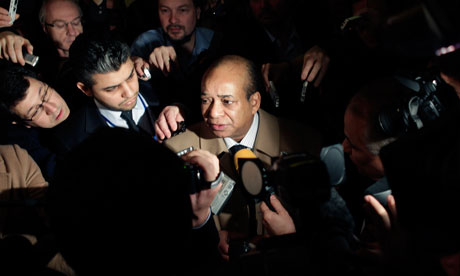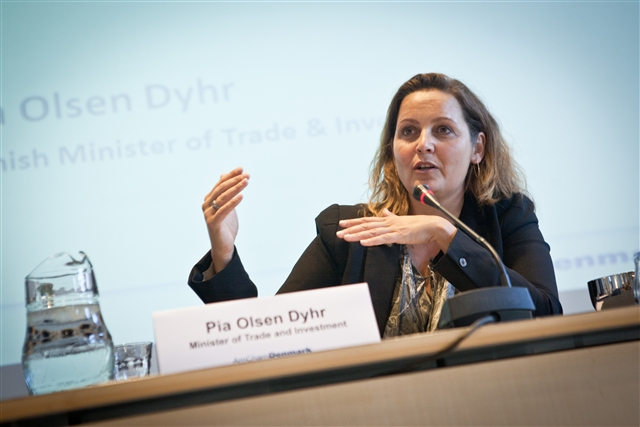By Ryszard Bouvier and Nihal Zaroug.

Tripoli, 22 November:
Controversy has engulfed Libya’s permanent representative to the United Nations following allegations made in his . . .[restrict]new book that Qatari officials bragged of “beautiful nights” spent in the company of Libyan girls during last year’s revolution.
Abderrahman Shalgham, who made worldwide headlines in February 2011 when he publicly denounced Muammar Qaddafi before the UN in New York, also accuses Qatar of ruthlessly pursuing “concealed” interests in Libya, stealing remnants of biological weapons from abandoned military sites, and attempting to further its own ideological agenda.
“Oil carries in it the virus of megalomania and the bacteria of delusion”, writes the ambassador, in a thinly-veiled warning to the oil-rich emirate, “which is what occurred under Qaddafi”.
The book has sparked fury amongst women’s rights groups in Libya, prompting calls for Shalgham’s immediate dismissal on the grounds of gross disrespect shown to Libyan women.
The Justice and Construction Party (JCP) has also issued a statement calling for Shalgham to be summoned for questioning over his allegations, whilst the Wattan party has demanded he be hauled before the Integrity Commission.
Shalgham is known to be critical of the influential emirate, but the detailed revelations and explicit accusations against Qatar’s Emir and Crown Prince that feature in his writings have taken his deliberate exposure to another level.
Immediately after it came out in early November, “The End of Gaddafi” became the object of public debates. By touching upon claims of liaisons between Qataris and Libyan women, the book has broached an highly sensitive issue that usually remains unspoken.
In his book, the UN Ambassador does acknowledge the pivotal role that the Gulf state played in bringing about the downfall of the Qaddafi regime by providing “unlimited financial, political and military support to the Libyan Revolution” and by lobbying for the NATO intervention. Thereby, he claims, “Qatar became the reference point (qibla) for all Libyans”.
Support, Shalgham claims, did not come unconditionally. “We believed that the motive (for supporting the Revolution) was to bring about freedom, stop the killing and open the door to progress for the Libyan people”, he writes.
“But from July 2011 on, evidence of concealed interests began to appear and soon became blatant”. The diplomat accuses Qatar of furthering its own ideological agenda in Libya by pushing for certain candidates, buying loyalties and imposing policy.
Shalgham gives a few examples of what he thinks proves Qatar’s excessive meddling in Libyan domestic affairs. For instance, he writes, Qatar provided a “political ideological organisation” in Libya with “huge quantities of weapons” and “hundreds of millions of dollars”; sent Qatari officers to take over abandoned military sites near Sirte and seize remnants of biological weapons for their purposes, and set up its own military base in the South of the country.
Furthermore, adds Shalgham, Qatari troops for a time took control of the eastern town of Tobruk and subjected locals to humiliating security controls. Meanwhile, “Qatari officials and soldiers were showing off the ‘beautiful nights’ they were spending in the company of Libyan girls”.
In the chapter “Me, the Emir and his Son”, Shalgham recounts several encounters with the Qatari ruling family in Doha and New York through which he became aware of the scope of Qatari involvement.
The Libyan diplomat gives what he claims are detailed witness accounts of Sheikh Tamim Bin Hamad Al-Thani’s “arrogant attitude” towards Libyans. During a visit to Doha following the liberation of Libya, the young crown prince (and heir apparent) supposedly told Shalgham and Mahmud Shamam that after the $3 billion it had spent on helping Libya, Qatar could not simply step back without recovering the money.
Shalgham assured the Qatari leadership that Libya was prepared to pay back its debt, he claims. Both he and Shamam tried to put the crown prince in his place in a diplomatic manner, emphasising Libyans’ hostility towards foreign meddling. According to the book, Sheikh Tamim Al-Thani tried to press his visitors into engaging more with people at the conservative end of Libya’s political spectrum, such as Ali Al-Salabi and Abdulhakim Belhaj of the Wattan party, ignoring Shalgham’s assurance that Libyans were perfectly able to talk to each other without foreign mediation.
This visit and another encounter with Emir Hamad Bin Khalifa Al-Thani himself, during which the latter boasted to the Libyan delegation that he had the ability to collect all weapons in Libya within 24 hours and gave interim Prime Minister Mahmud Jibril paternalistic advice on how to run his country prompted Shalgham to write that “the Emir speaks of the Libyan situation as if he was speaking of his personal bathroom”.
Shalgham also recounts a conversation with a well-connected American oilman who claims that his company would be willing to invest large sums in Libya but for the fact that Qatar had supposedly ruled out any possibility of entering the Libyan oil sector without granting it a share in the venture. According to this source, the Emirate has already taken control of four vital sectors of the Libyan State, namely the oil industry, the security apparatus, finance and investments, and the army.
This, Shalgham says, corroborates other statements he has heard from people across the region, according to which the Emir of Qatar is bolstering Islamist parties in North Africa, seeking to create an “Islamic Union” under his own leadership.
Put mildly, Shalgham’s claims are controversial. Reactions – both from the “Libyan street” and from domestic political forces – have been accordingly violent.
In addition to demanding he be summoned for questioning over his allegations, the Justice & Construction party has also gone on the offensive. As a Libyan representative abroad, the party has said, Shalgham should not make such statements without following diplomatic protocol and thereby “perpetuate the ways of the former regime”, whose lack of respect for states and public figures was legendary. On the diplomatic arena, statements should not be of personal nature or made in order to settle political score, said the party.
Unsurprisingly, the Wattan party has aso issued a similar statement questioning the validity of Shalgham’s claims and requesting clarification from the Ministry of Foreign Affairs.
Taking it further than the JCP, Al-Wattan calls for Shalgham to be referred to the Integrity Commission, suggesting that his position as Libya’s ambassador to the UN should be revoked. Well aware of the fact that some view it as a Qatari stooge and that any defence of Qatar will play into the hands of its political opponents, the party emphasises that Libya’s sovereignty and territorial integrity shall be guaranteed and that any kind of foreign interference categorically rejected.
Shalgham’s remarks on Qatari officers and local women have prompted public outrage and calls for legal action against the diplomat. In a letter addressed both to Congrss and Dar Al-Ifta (Libya’s Fatwa Office) the Libyan Women’s Association (LWA) has called for his immediate dismissal.
This is not the first time Shalgham has stirred up public debate with provocative claims. Libya’s UN representative is known for his decidedly critical stance regarding Qatar. Last November, he had already accused the Emirate of providing funds and weapons to Libyan Islamists and reportedly said that Libya would not allow itself to be controlled by “tiny Qatar”.
Then again, Shalgham’s allegations do reflect how Libyans generally feel about outside interference. Only recently, demonstrations in Benghazi and other places have shown that Qatar has become a prime target of popular protest and possibly also a scapegoat for domestic problems.
Whilst Qatar’s role might be particularly disputed in Libya, where it helped overthrow the regime, people across the region are reticent to allow the Gulf countries, and Qatar in particular, to extend their influence further. This is hardly surprising, given Qatar’s disproportional role in regional politics and its media power, which it indirectly derives from Al-Jazeera.
Whilst the international broadcaster, whose headquarters are in Doha, was hugely influential in the early stages of the Arab uprisings, its reputation has been tarnished by what many in the Arab world perceive as one-sided and activist reporting. [/restrict]











